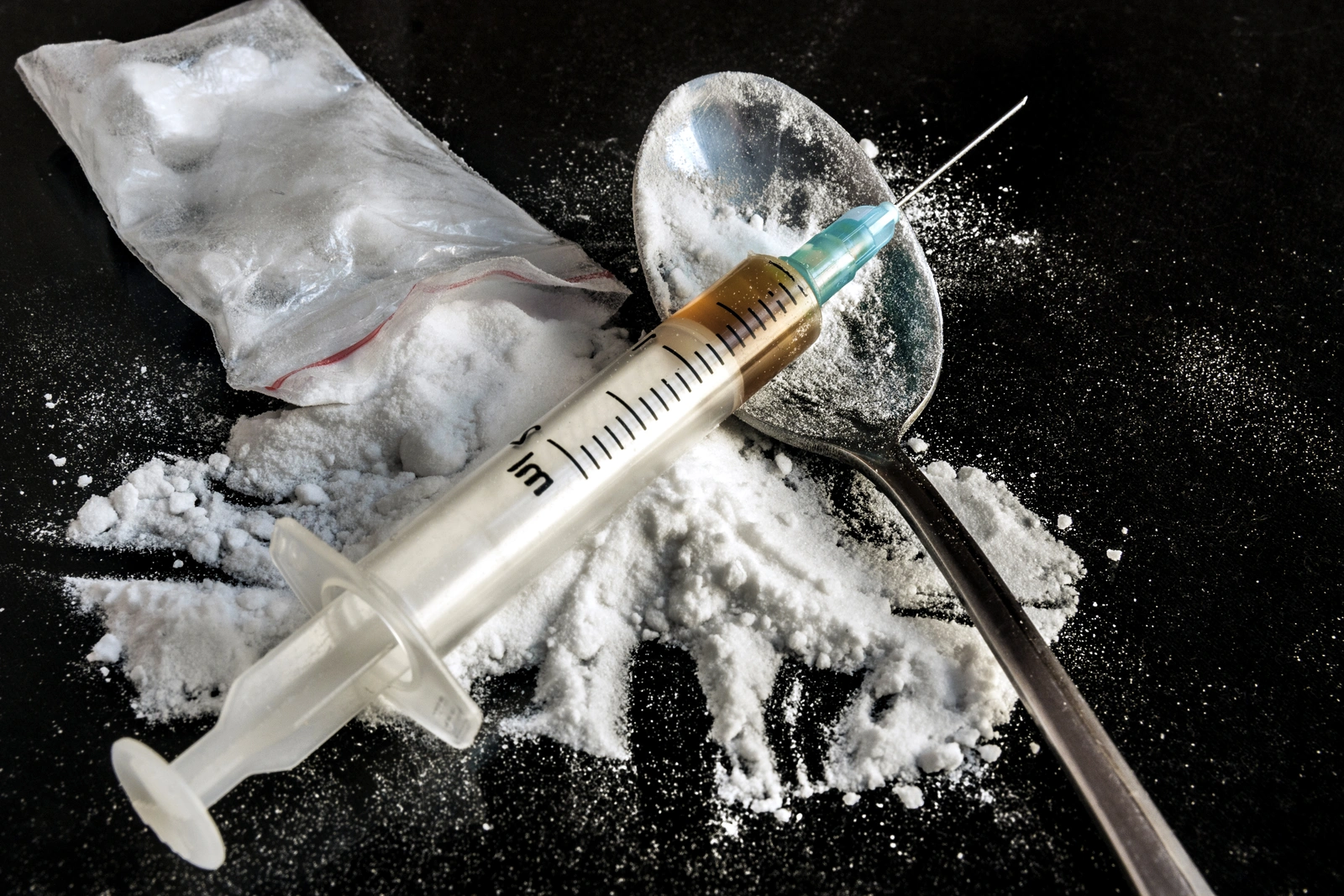Heroin Addiction: Signs and Symptoms
Addiction to heroin presents significant dangers, both physically and psychologically. Beyond the immediate risk of overdose, which can lead to respiratory failure and death, the long-term effects of heroin use can ravage the body and mind.[1]
Chronic use can result in collapsed veins, heart infections, liver and kidney disease, as well as co-occurring mental health disorders such as depression and anxiety.[2] Moreover, the lifestyle associated with heroin addiction often leads to social isolation, financial instability, and involvement in criminal activities.[3]
- Heroin addiction poses significant dangers physically and psychologically, with long-term effects including respiratory failure, heart infections, and mental health disorders.
- Physiologically, heroin abuse leads to respiratory depression, heart problems, and a weakened immune system, while psychologically, it fosters social isolation and financial instability.
- Treatment options for heroin addiction encompass various levels of care, including detoxification, residential treatment, family programs, and discharge planning, as well as several therapeutic modalities to address the complex nature of addiction and promote recovery.
What Is Heroin?
Heroin, which is derived from morphine, is a highly addictive opioid drug synthesized from the opium poppy plant.[4, 5] It is typically sold as a white or brownish powder, though it can also appear as a black, sticky substance known as “black tar heroin.”
When ingested, heroin binds to opioid receptors in the brain, producing an intense rush of euphoria and relaxation.[6] This pleasurable sensation is often what drives people to continue using the drug despite its severe consequences.
Heroin’s addictive properties stem from its ability to rapidly cross the blood-brain barrier, resulting in a swift onset of effects.[7] Over time, tolerance builds, requiring higher doses to achieve the desired high. As dependence develops, users may experience debilitating withdrawal symptoms when attempting to quit, including nausea, vomiting, muscle pain, and intense cravings.[8]
Heroin Addiction and Abuse
Heroin addiction and abuse are characterized by a profound and often devastating impact on people’s lives. The intense euphoria from using heroin creates a powerful psychological craving for the drug, driving people to prioritize obtaining and using heroin above all else.
Additionally, heroin’s sedative effects, such as profound relaxation and pain relief, can provide temporary relief from physical or emotional distress, further reinforcing its use as a coping mechanism.
Physiologically, heroin abuse wreaks havoc on the body, leading to a range of health complications. Chronic use can result in respiratory depression, heart problems, liver and kidney disease, and a weakened immune system. Injecting heroin increases the risk of infectious diseases such as HIV/AIDS and hepatitis due to needle-sharing practices.[9]
Despite these grave risks, heroin addiction remains a significant public health concern, with millions of individuals worldwide struggling within its grip. According to the 2021 National Survey on Drug Use and Health, over 1.1 million people in the US (over the age of 12) used heroin in the past year, with over 9,000 people passing away from an overdose that same year.[10]
Substances We Treat

Heroin Quick Reference Chart
Drug Category
Commercial & Street Names
DEA Schedule
Administration
What Are the Signs of Heroin Addiction?
Recognizing the signs of an opioid addiction can be crucial for early intervention and support. How to tell if someone is doing heroin can include physical symptoms such as pinpoint pupils, drowsiness, and slowed breathing. Behavioral changes such as social withdrawal, neglect of responsibilities, and secrecy regarding activities and whereabouts may also be apparent.
Additionally, people struggling with heroin addiction may exhibit financial difficulties, such as borrowing money frequently or selling personal belongings to support their habit. Psychological signs can include mood swings, irritability, and difficulty concentrating when not using the drug. Finally, the presence of paraphernalia, such as needles, syringes, burnt spoons, and small plastic bags, can also serve as tangible evidence of heroin use.

What Are the Symptoms of Heroin Addiction?
The symptoms of heroin addiction encompass a broad spectrum, affecting various aspects of your physical, emotional, and social well-being: [11]
Tolerance:
Needing increased amounts of heroin to achieve the desired effects due to the body’s adaptation to the drug.
Withdrawal:
Experiencing intense physical and psychological symptoms when attempting to cut back or stop using heroin, such as nausea, vomiting, muscle aches, insomnia, and anxiety.
Track marks:
Visible scars or puncture wounds on the skin, particularly in areas where heroin is injected.
Deterioration of physical health:
Heroin abuse can lead to weight loss, skin infections, dental problems, and respiratory issues.
Emotionally and socially, symptoms may include:
Social withdrawal:
Becoming increasingly isolated from friends, family, and social activities due to heroin use.
Neglect of responsibilities:
Prioritizing obtaining and using heroin over work, school, or familial obligations.
Financial difficulties:
Experiencing financial strain or engaging in illegal activities to fund the heroin habit.
Mood swings and irritability:
Fluctuations in mood, ranging from euphoria during heroin use to irritability and depression during withdrawal periods.
What Are My Treatment Options for Heroin Addiction?
Heroin rehab encompasses a variety of approaches aimed at addressing the complex physical, psychological, and social aspects of addiction. These heroin addiction treatment options include different levels of care and various therapeutic modalities:
Levels of Care
Discharge Planning
Therapeutic Modalities
Frequently Asked Questions About Heroin Addiction
What are the physical health effects of long-term heroin use?
Long-term heroin use can have profound and damaging effects on physical health. These can include collapsed veins, heart infections, liver and kidney disease, gastrointestinal issues, respiratory problems, and an increased risk of infectious diseases such as HIV/AIDS and hepatitis.
Can heroin addiction lead to overdose and death?
Yes, heroin addiction can lead to overdose, which can result in respiratory depression, coma, and death. Heroin overdose occurs when a person consumes a dose of the drug that overwhelms the body’s ability to metabolize it. Immediate medical intervention, including the administration of naloxone, is crucial in reversing the effects of heroin overdose and preventing fatalities.
What should I do if I suspect a loved one is addicted to heroin?
What are the legal consequences of heroin possession and distribution?
The legal consequences of heroin possession and distribution vary depending on the jurisdiction and the quantity of heroin involved. Possession of heroin is typically a criminal offense and can result in fines, probation, mandatory drug treatment programs, and incarceration. Distribution or trafficking of heroin often carries more severe penalties, including lengthy prison sentences. Legal consequences can have long-lasting impacts on people’s lives, affecting employment opportunities, housing, and relationships.
Sources
[1] Heroin overdose: MedlinePlus Medical Encyclopedia. (n.d.). Medlineplus.gov. https://medlineplus.gov/ency/article/002861.htm on June 3, 2024
[2] National Institute on Drug Abuse. (2020, April). The connection between substance use disorders and mental illness. National Institute on Drug Abuse. https://nida.nih.gov/publications/research-reports/common-comorbidities-substance-use-disorders/part-1-connection-between-substance-use-disorders-mental-illness on June 3, 2024
[3] Rong, C., Jiang, H.-F., Zhang, R.-W., Zhang, L.-J., Zhang, J.-C., Zhang, J., & Feng, X.-S. (2016). Factors Associated with Relapse among Heroin Addicts: Evidence from a Two-Year Community-Based Follow-Up Study in China. International Journal of Environmental Research and Public Health, 13(2). https://doi.org/10.3390/ijerph13020177 on June 3, 2024
[4] Heroin overdose: MedlinePlus Medical Encyclopedia. (n.d.). Medlineplus.gov. https://medlineplus.gov/ency/article/002861.htm on June 3, 2024
[5] Alcohol and Drug Foundation. (2021, November 10). Opium – Alcohol and Drug Foundation. Adf.org.au. https://adf.org.au/drug-facts/opium/ on June 3, 2024
[6] Mazzeo, F., Meccariello, R., & Guatteo, E. (2023). Molecular and Epigenetic Aspects of Opioid Receptors in Drug Addiction and Pain Management in Sport. International Journal of Molecular Sciences, 24(9), 7831. https://doi.org/10.3390/ijms24097831 on June 3, 2024
[7] Drug Enforcement Administration. (2020). WHAT IS HEROIN? WHAT IS ITS ORIGIN? https://www.dea.gov/sites/default/files/2020-06/Heroin-2020.pdf on June 3, 2024
[8] Kudrich, C., Hurd, Y. L., Salsitz, E., & Wang, A.-L. (2021). Adjunctive Management of Opioid Withdrawal with the Nonopioid Medication Cannabidiol. Cannabis and Cannabinoid Research. https://doi.org/10.1089/can.2021.0089 on June 3, 2024
[9] World Health Organization. (2023). People Who Inject Drugs. Www.who.int. https://www.who.int/teams/global-hiv-hepatitis-and-stis-programmes/populations/people-who-inject-drugs on June 3, 2024
[10] National Institute on Drug Abuse. (2018, June). What is the scope of heroin use in the United States? National Institute on Drug Abuse. https://nida.nih.gov/publications/research-reports/heroin/scope-heroin-use-in-united-states on June 3, 2024
[11] National Institute on Drug Abuse. (2018). What are the immediate (short-term) effects of heroin use? National Institute on Drug Abuse. https://nida.nih.gov/publications/research-reports/heroin/what-are-immediate-short-term-effects-heroin-use on June 3, 2024




